This “Limited Edition” Blu-ray from Arrow Video is currently available for purchase.
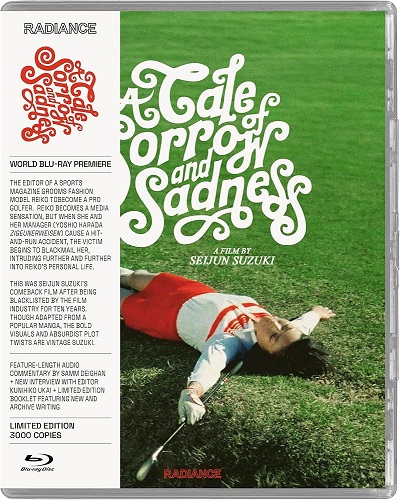
It’s a busy week for Radiance Films. Girl with a Suitcase is now available on Blu-ray, as well as this Japanese effort that shares some common thematic elements. You might not think that a movie about golf would necessarily have a lot of similarities with the other title listed above. But those who decide to check it out will realize very quickly that the sport is only a backdrop for what this feature is really all about. It’s a tale of a woman struggling to survive and be herself in a male-dominated world that seeks to control her, and how she copes with incredible pressure along the way.
A Tale of Sorrow and Sadness arrives from cult film director Seijun Suzuki (Underworld Beauty, Tattooed Life, Tokyo Drifter, Branded to Kill) is a well-made, interesting and engaging story and its story elements are still applicable today. And if that wasn’t enough, the story behind the movie is just as interesting. Once again, Radiance Films has done an excellent job on this Blu-ray, which offers an improved picture and fascinating bonus features.
The unique plot involves a former model Reiko Sakuraba (Yuko Shiraki) who is encouraged by her manager/partner Mr. Miyake (Yoshio Harada) to become a pro golfer. But truth be told, the main character is only introduced ten minutes into the picture. This film begins with a fashion company looking to manufacture a celebrity for their products. After one potential figure falls through and they learn about Reiko having a natural talent for the game of golf, they begin making offers to Mr. Miyake to help push her into finding success. Reiko soon shocks the world with a major tournament victory.
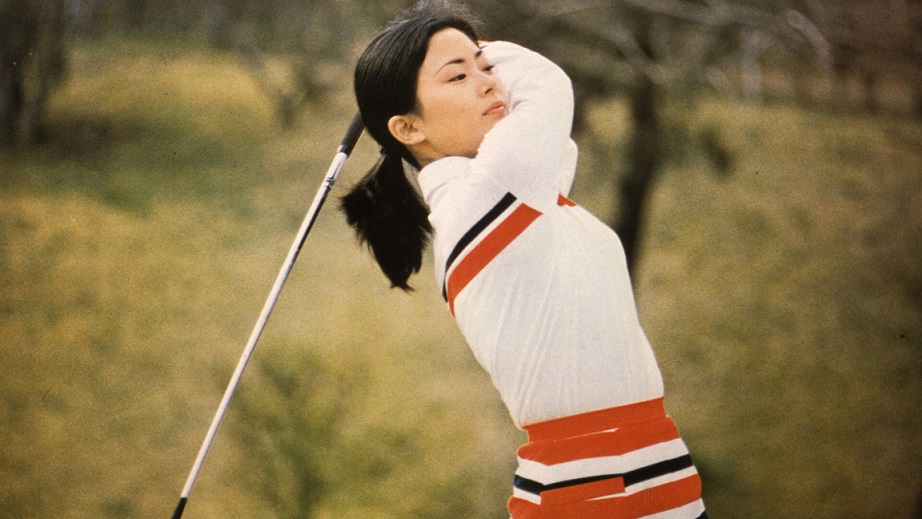
Unfortunately, success and money have some serious drawbacks. Those around her push her to star in their TV program and sell more products. When she moves into a modern mansion, she has difficulty getting on with neighbors, who see her as a member of the “lower-class” that doesn’t belong with them. Then, Mr. Miyake then runs down a local in his car with Reiko as a passenger. The victim, Kayo Semba (Kyoko Enami) survives, and doesn’t go to the authorities. She happens to be a fan of Reiko, and begins stalking and blackmailing the protagonist instead. Kayo doesn’t want money so much as Reiko’s attention, lodging herself into the lead’s life and family (the star has a younger brother whom she cares for). The pressures of fame, fortune and isolation from normality really start taking their toll on Reiko, and she is eventually pushed to the brink of sanity.
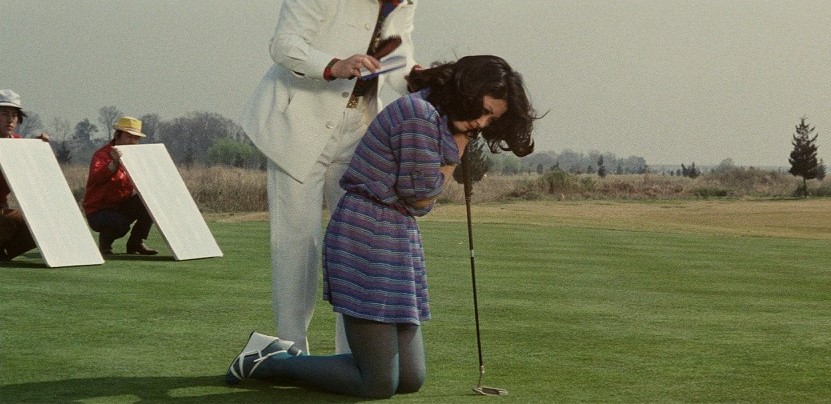
The film is fascinating in its criticism of capitalism and all that the system entails. While the movie was made over 50 years ago, it is even more relevant now than before. Almost every character in the film is using the protagonist in some way or another, and Reiko has her personality ripped from her in the process. It’s all darkly funny early on, and the satirical elements are deftly delivered. There’s a hilarious game of golf played between Mr. Miyake and an executive early on. They can barely hit a ball as they plan out the future career and possibilities for Reiko. We also see examples of marketing people creating a new look for Reiko, all designed to manipulate the public and make them buy products.
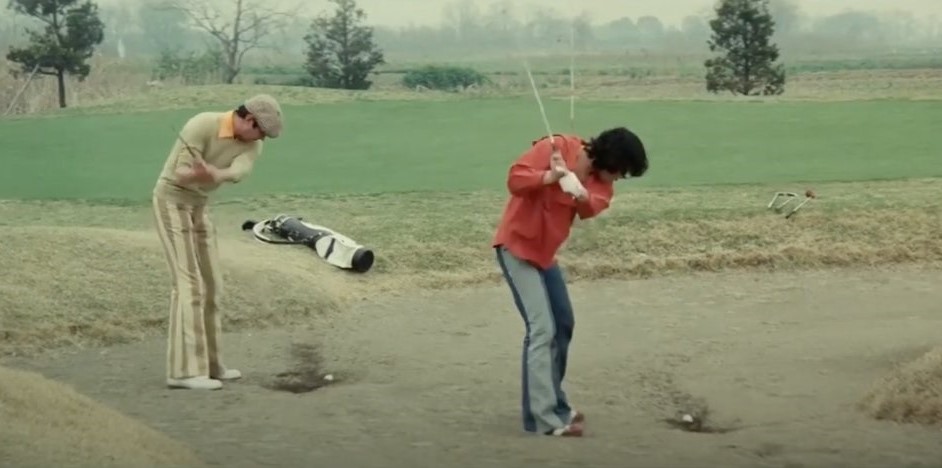
The effective humor moves aside for darker material in the second half of the picture, when Reiko and Mr. Miyake lose control over the situation and begin a downward spiral. The scenes with Kayo are incredibly creepy, as she ultimately suggests that Reiko sleep with her own husband in order to make their relationship even closer. Every character is psychologically and/or physically damaged by the close. Mr. Miyaki gets so frustrated that his temper gets very out of hand with executives and the feature climaxes with disturbing scenes of violence involving Reiko’s young brother that send chills down the spine. It’s a surreal but ultimately effective display of extreme commercialism altering people and undoing lives.
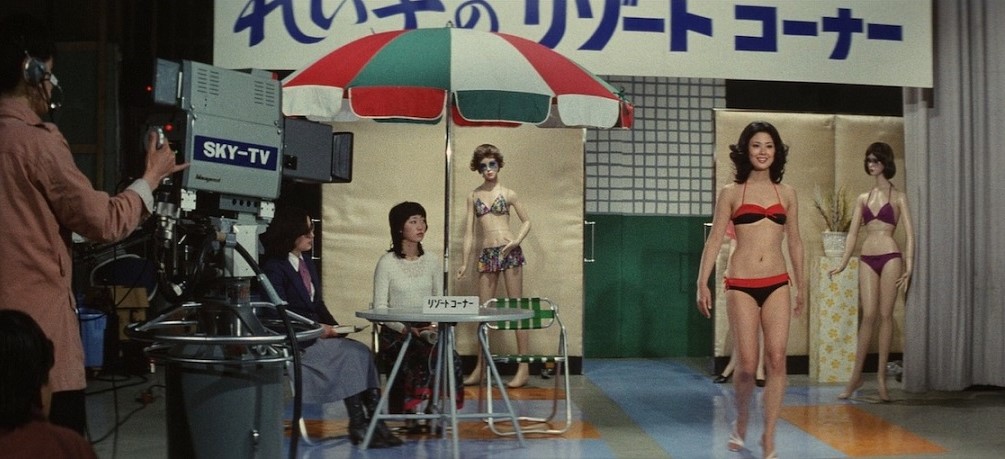
The movie is also impressively shot. This director is known for using a lot of color and this title is no exception, with greens from the golf courses and clothing popping off the screen. The modern mansion design with yellow walls and other unique color choices is also interesting, particularly as it is contrasted with blood being split and red flames burning eventually burning around the home.
There is a lot going on, and while the film could probably do with moving at a slower pace to let its themes sink in, it’s still extremely effective. This is one of those movies that you’re unlikely to forget after taking it in. It was ahead of its time and cleverly shows how people are turned into celebrities and crack under pressure. This is with little to no concern from the executives who made them and are more than ready to move on and start using another individual for their own profit.

The image quality is solid, considering the feature has been hard to find and that the studio behind it has never been particularly interested in restoring it. There is some grain here and there in some scenes, but this is a strong widescreen image overall. The more colorful and surreal moments of the film look striking and really pop. This is probably the best the movie has ever looked.
This Blu-ray includes a couple of notable extras. There is an informative film critic commentary. The speaker offers a lot of information about director Suzuki and his career, in addition to the ways he portrays women in his stories. She notes that female characters display more physicality than in other pictures of this and later eras. The speaker is impressed with the way he depicts women, and in this case showing one slowly being turned into a product by those around her.
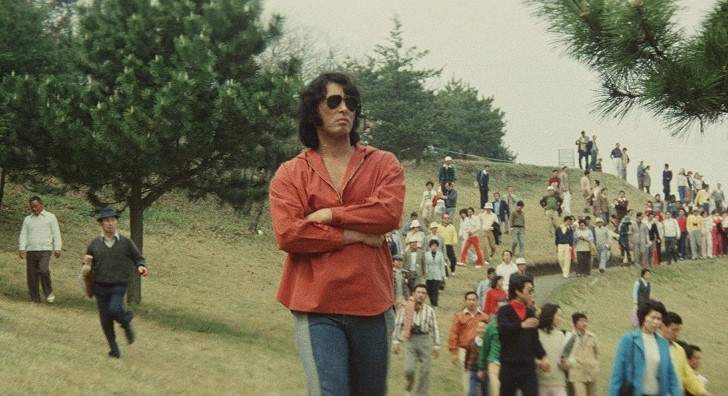
The disc also comes with a great interview with the film’s editor. He shares his personal relationship with Seijun Suzuki and what was going on behind the scenes at the time. There was a ten-year break between this picture and his previous entry because he had been blacklisted by Nikkatsu, the studio whom he worked for. While the moviemaker had been making B-pictures and gaining more and more fans (particularly among university students and young audiences), for pushing boundaries and dealing with complex themes, his bosses didn’t like his work. After warning him that he was “going too far” with his stories, they started cutting his budgets. When Branded to Kill came out and was successful, his angry employers blacklisted him.
The editor notes that he and others came out to support Suzuki and his fight with the studio. After a lawsuit and ten years away from filmmaking, he finally got another directing job with A Tale of Sorrow and Sadness. And yes, even after so long, he made another film that pushed buttons and dealt with controversial themes. Of course, his works are now held in high regard, but the speaker goes into all the difficulties Suzuki endured to get his projects made.
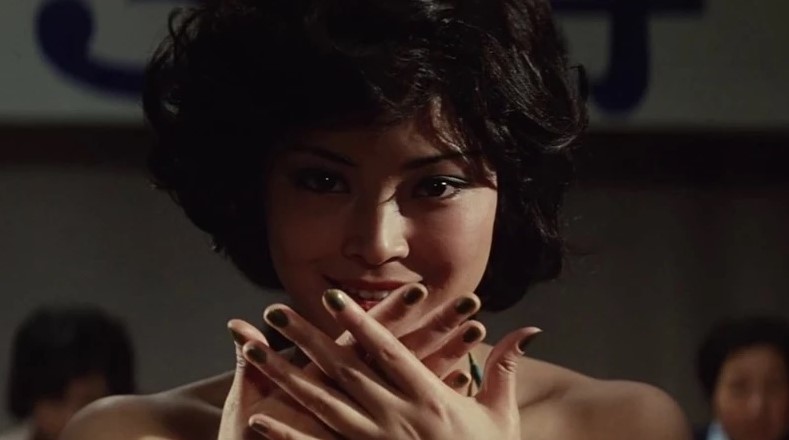
The disc also comes with a trailer, and like other Radiance Films titles, a booklet with writing on the movie, and a reversible sleeve with original and newly commissioned artwork for the film.
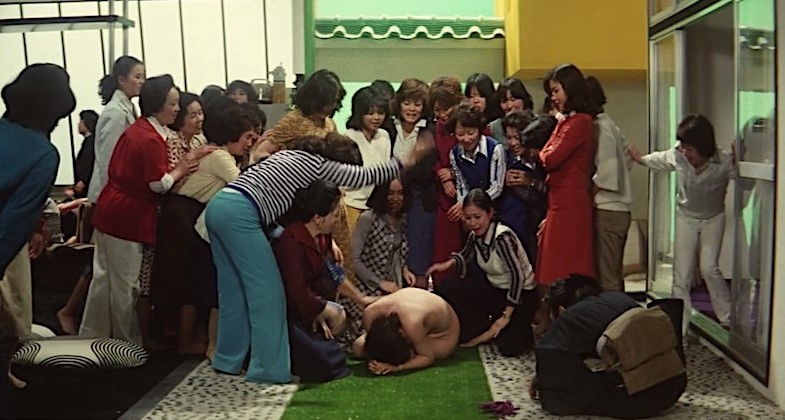
Radiance Films have discovered another unusual and engrossing picture with A Tale of Sorrow and Sadness. It will impress anyone who enjoys international cinema and movies that attack the status quo. I was very impressed with the film (particularly with the satirical elements about creating celebrities in the first half of the movie) and am happy to have discovered it. The distributor has printed 3000 copies of the Blu-ray and it is now available, so snatch it up while you can.


